As a critical part of the 2021 World Artificial Intelligence Conference (WAIC 2021) which opened on July 8, the AI Forum of Academic Association Presidents themed "Artificial Intelligence empowering the digital transformation of cities" was held at the Shanghai World Expo Exhibition & Convention Center (SWEECC) on the afternoon of July 8. The forum was hosted by the WAIC Organizing Committee Office and organized by Tongji University. WU Qing, Member of the Standing Committee of CPC Shanghai Municipal Committee and Vice Mayor of Shanghai, attended and delivered a speech.
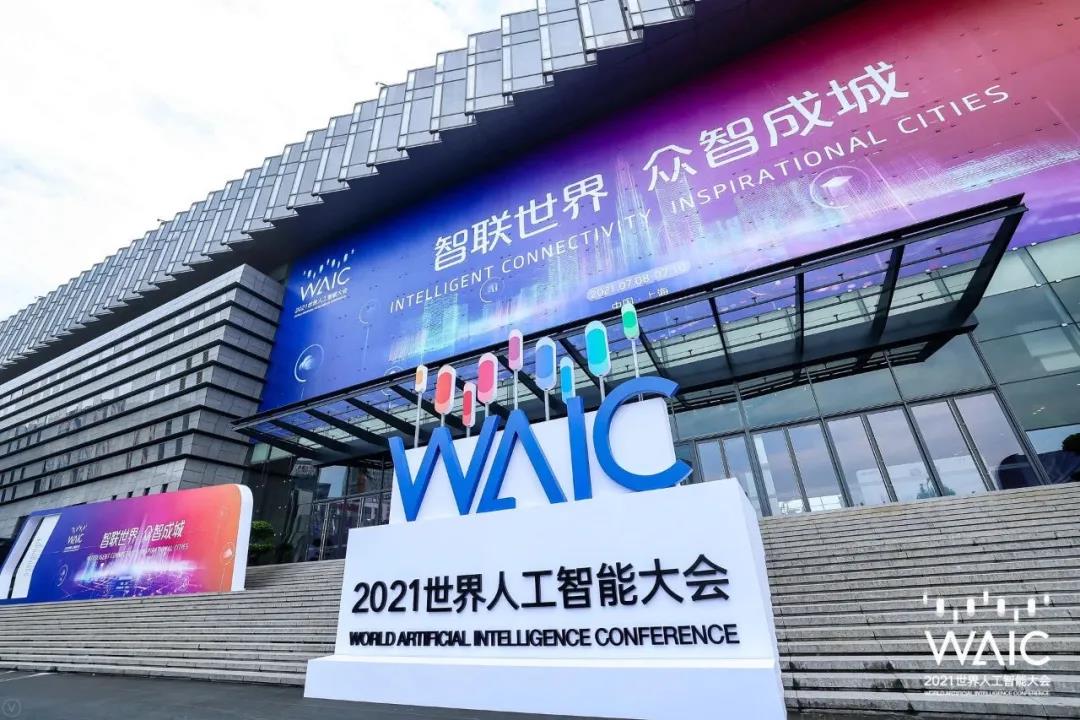
The AI Forum of Academic Association Presidents of the WAIC 2021
ZHANG Ying, Deputy Director of Shanghai Municipal Commission of Economy and Informatization, LI Yongzhi, Deputy Director of Shanghai Municipal Education Commission, ZHOU Lan, Deputy Director of Shanghai Municipal Commission of Commerce, ZHANG Hongtao, Chief Engineer of Shanghai Municipal Commission of Economy and Informatization, and delegates from Shanghai districts and counties attended the forum.
The forum invited the presidents and vice-presidents of the national academic associations of computer, mathematics, automation, control, simulation, graphics and other AI and related fields, including 15 academicians and a number of senior experts and scholars: ZHENG Nanning, member of the Chinese Academy of Engineering (CAE) and President of the Chinese Association of Automation; TIAN Gang, member of the Chinese Academy of Sciences and President of the Chinese Mathematical Society; WU Jiangxing, member of the CAE and Director of the National Digital Switching System Engineering & Technological R&D Center of China; FANG Binxing, member of the CAE and President of the Chinese Information Processing Society of China; GAO Wen, member of the CAE and former President of the China Computer Federation; ZHAO Qinping, member of the CAE and former President of the China Simulation Federation; GUI Weihua, member of the CAE, Vice President of the Chinese Association of Automation and Vice President of the Nonferrous Metals Society of China; FEI Aiguo, member of the CAE and President of the Chinese Institute of Command and Control; WU Jianping, member of the CAE and Vice President of the Internet Society of China; CHEN Chun, member of the CAE and Director of the National Train Intelligent Engineering Technology Research Center; WANG Yaonan, member of the CAE and President of the China Society of Image and Graphics; FANG Shou’en, Secretary of the CPC Committee of Tongji University; CHEN Jie, President of Tongji University, member of the CAE, Vice President of the Chinese Association of Artificial Intelligence, Vice President of the Chinese Association of Automation, and Vice President of the Chinese Institute of Command and Control; WU Zhiqiang, member of the CAE and Vice President of the Urban Planning Society of China; LV Xilin, member of the CAE and Vice President of the International Association for Experimental Structural Engineering; SHEN Xiangyang, foreign member of the National Academy of Engineering and Honorary Vice President of the Chinese Association of Artificial Intelligence; GU Xianglin, Vice President of Tongji University and Vice President of the China Civil Engineering Society; TONG Xiaohua, Vice President of Tongji University; DAI Yuhong, Researcher of the Academy of Mathematics and Systems Science of the Chinese Academy of Sciences and President of the Operations Research Society of China; and SUN Fuchun, Professor of Tsinghua University and Vice President of the Chinese Association of Artificial Intelligence.
In his speech, WU Qing, on behalf of Shanghai Municipal Committee of the Communist Party of China and Shanghai Municipal People’s Government, expressed his heartfelt thanks to the participating academicians and experts for their long-term care, guidance and support to Shanghai. Mr. WU noted that the latest global revolution in science and technology and industrial transformation were advancing rapidly, and Artificial Intelligence (AI), as one of the most crucial and active areas, was also profoundly changing the way of human production, life and thinking. Currently, Shanghai was strongly promoting the construction of "Shanghai Highland" of AI, with continuous new advances. This year, Shanghai took the lead in releasing the opinions on fully advancing the urban digital transformation, to further expand and strengthen the AI industry. To be specific, the basic research of AI should be strengthened to better play a leading role in the urban digital transformation. Mr. WU sincerely expected all academicians and experts to actively offer their valuable insights and jointly help to raise the construction of "Shanghai Highland" of AI to a higher level.
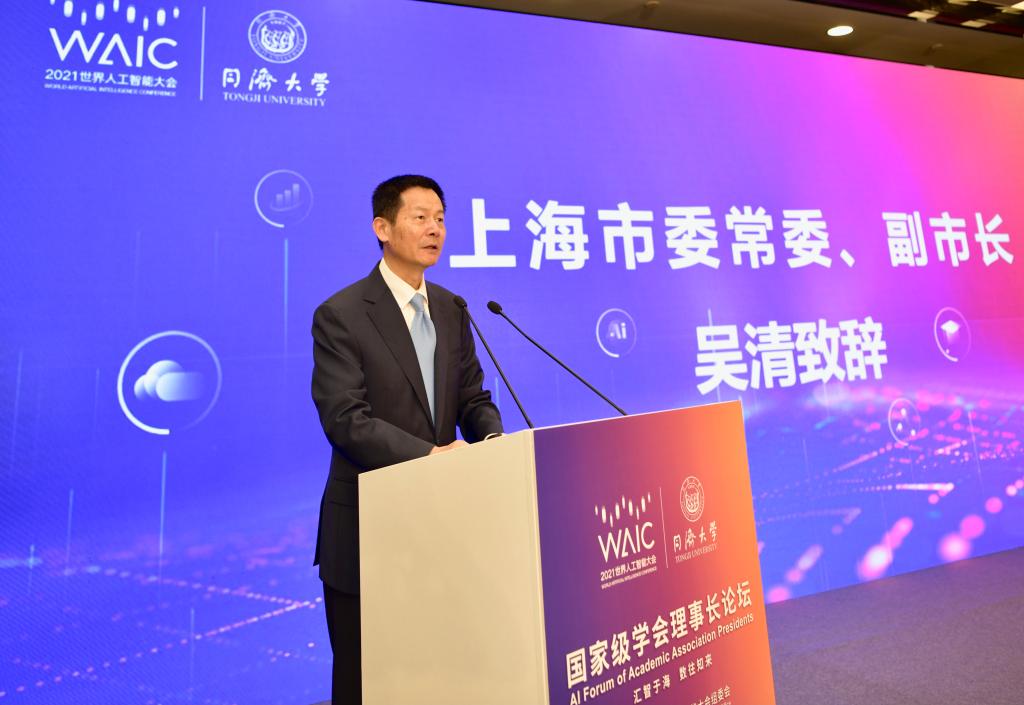
WU Qing delivering a speech
FANG Shou’en pointed out in his speech that there were many basic scientific problems and common key technical problems that needed to be addressed urgently in the urban digital transformation. Tongji University would give full play to its advantages in discipline characteristics, and focus on addressing the difficulties in the digital transformation of Shanghai, enabling deeper participation in the digital transformation of Shanghai and providing better related services. Mr. FANG hoped that academicians and experts would actively provide suggestions and advice for the digital transformation and development of Shanghai and even China, bringing new thoughts and inspirations to the development of AI-related disciplines, and also help Tongji University to make new and greater contributions to national reform and development and Shanghai urban construction on the new journey of achieving the second centenary goal.
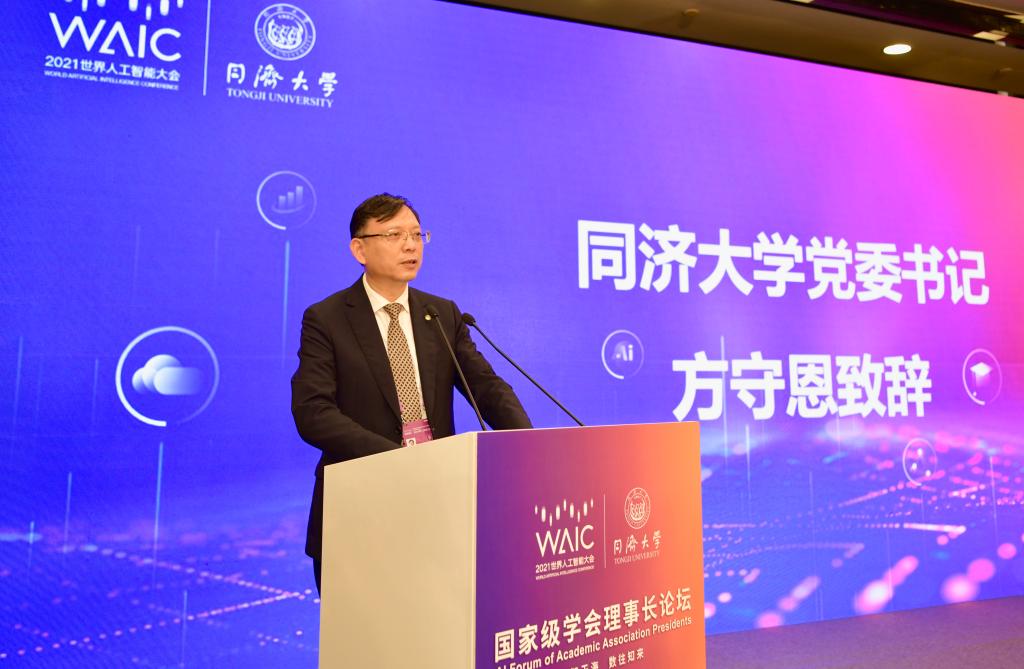
FANG Shou’en delivering a speech
In the session of the keynote speech, ZHANG Hongtao introduced the top priorities of Shanghai to fully advance the urban digital transformation, with an eye on the comprehensive digital transformation of the economy, life and governance. TONG Xiaohua highlighted the thoughts on digital transformation, as well as Tongji University's exploration and practice in terms of urban digital transformation.

ZHANG Hongtao delivering a speech
CHEN Jie and GU Xianglin presided over the discussion session and the keynote speech session respectively. Academicians and experts, centering on the topic of "AI and Digital City", from the perspectives of their respective associations or societies, offered their suggestions on how AI can empower the digital transformation of cities. They believed that AI-empowered digital transformation of cities had become an inevitable trend given the major practical needs of modern urban economy, life and governance. In promoting the urban digital transformation, Shanghai should allow for government-led and market-oriented operation with extensive public participation. While underlining the basic digital construction, Shanghai should focus on relieving the widely concerned difficulties and pain points about people's wellbeing such as traffic and medical care, to enable the people to have an intuitive sense of the urban digital transformation.
Academicians and experts also pointed out that in the process of promoting the digital transformation of Shanghai, it was necessary to prevent security risks, take security as the basis, strengthen the protection of data privacy while tapping into the data value, and intensify international cooperation in the ethics of science and technology, with a focus on the traditional cultural heritage of Shanghai. They hoped that Shanghai would make useful exploration in promoting its digital transformation, and provide replicable models and experience with Shanghai’s characteristics, in an attempt to better play an exemplary role for China's urban transformation and development.
CHEN Jie indicated in his concluding remarks that the forum attracted academicians and experts from different fields to plan the digital construction of Shanghai and the development of AI, and spark some new ideas about interdisciplinary integration. Tongji University would combine the two strengths of traditional dominant disciplines and information disciplines that had been flourishing in recent years, to make new contributions to the digital transformation and development of Shanghai.
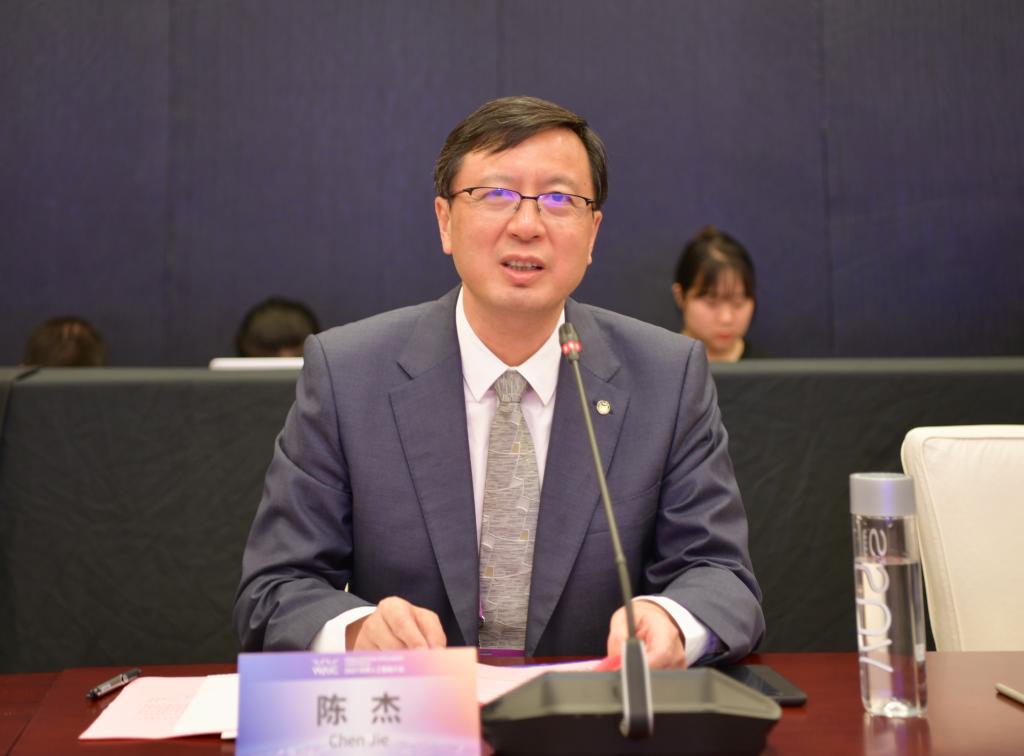
CHEN Jie delivering a speech
On the same day, the top AI journal exhibition of the WAIC 2021 was unveiled on the 5th floor of the SWEECC. The journal exhibition, hosted by the WAIC Organizing Committee Office and organized by Tongji University, consisted of three matrices, namely Science Group, Springer Nature Group and International Journal on Artificial Intelligence Tools (hosted in China), showcasing the latest AI frontier theories, innovative technologies, etc., as well as the connection and interaction between the AI and the urban development and life, to promote the cross-application of AI-related disciplines and probe into the significance of AI for the urban digital transformation and the progress of human civilization.
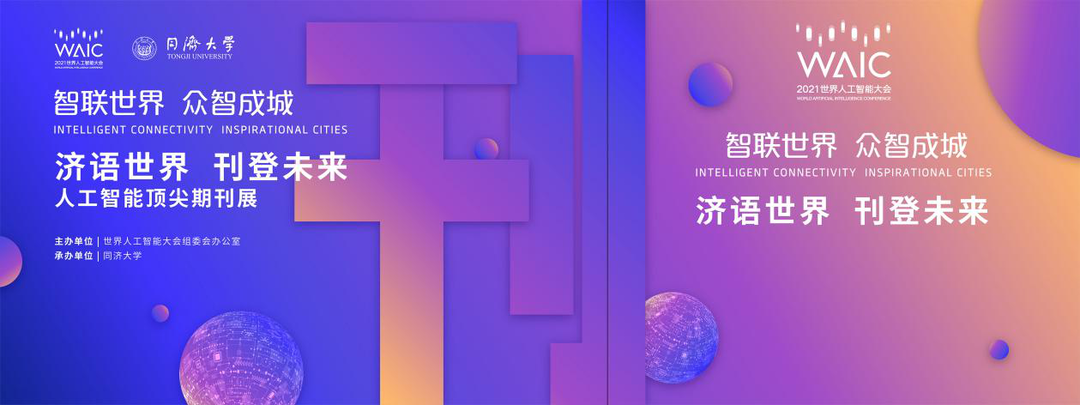
The top AI journal exhibition of the WAIC 2021 being unveiled on 5F of the SWEECC
A forum on the new-generation intelligent unmanned systems and their applications, organized by Tongji University, was to be held at the SWEECC on the morning of July 10. Intelligent unmanned systems were one of the important frontier development directions in AI research. The forum would center on the world's frontier major scientific issues and key core technologies in the development of new-generation intelligent unmanned systems and their applications, and explore the future driving force of intelligent unmanned systems for scientific and technological development as well as industry development. (Text by HUANG Aijiao; Photo by JIANG Ping; Video by WU Yixiang)
https://news.tongji.edu.cn/info/1003/78182.htm